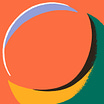A Smile for You, Watts of Brilliance
Ayelet Amittay serves up poems from her forthcoming book plus new work

Gladys Knight figures consequentially in unanticipated ways. Last week, I shared with you a transcendent moment at the edge of her stage, and this week, I’ll offer another stage, a karaoke stage in Ann Arbor, Michigan back in 2004.
With winter raging outside, I found myself for the first time at karaoke, nowhere I’d ever wanted to be but along for the ride with fellow poets and writers, when the familiar drums and horns from “Midnight Train to Georgia” cranked up, and Ayelet walked quietly to the stage and started belting out Gladys. I would have bet all money possible that this scene was impossible. But there it was, and wow, was it wonderful.
This is the thing about poetry, and poets. The unlikely capacity to turn normal on its ear and deliver joy, comfort, discomfort, and homecoming all at once and in the most unexpected places, the most unexpected ways, sits at the heart of things. Poetry is not easy. Neither are most poets I know, self included. But at their best, they offer and reveal a most nourishing essence, one that is inextricable from language and its power to make us human, to make us know we are human, to make us known.
The first and last of Ayelet’s four poems that follow are new and previously unpublished. The middle two are ekphrastic works in conversation with the prints of Cuban printmaker Belkis Ayón, who coincidentally was born exactly one year after I was. She died in Havana on September 11, 1999. I remember that time not for her death, but because I was with my Grandmother, for whom FED is named, in South Georgia, walking with her through her final time here. When she left us a few months later, I would head to Cuba, also coincidental, too late to meet Belkis, and so, I am all the more grateful to meet her now through Ayelet’s work. We are unable to offer the prints here, but both the prints and poems appear in Ayelet’s forthcoming book, The Eating Knife, due out from Fernwood Press in 2025. In the meanwhile, I encourage you to check out this spread from the Venice Biennale.
What this work makes clear, is that we are all connected by paths and spirals that are often never made clear, or that we fail to notice. Art, however, in all its manifestations, has the power to point us in the right direction and train our eyes to see, our bodies to feel, our senses to sharpen so that these connections are known. When we spend as much time as possible at art’s table, the rewards are limitless. So, too, is the obligation to see and know. Like poetry, this obligation isn’t easy, and too often we shy away, or take it on once it’s too late. The NYT obit for Ayón, annoyingly begins “overlooked no more,” as if that does the artist and the woman, the person, Ayón-herself, much good. Overlooked no more is for we who remain. Seen is for those who are here.
FED is for seeing, just as Ayelet’s and Ayón’s work is. When I pause to see, I am awed by nourishing coincidence and connection. And today, I am jaw-dropped by the intersections Ayelet’s four poems illuminate. Somehow today’s FED offering miraculously and simultaneously transports me to Baltimore and Brooklyn, South Georgia and Havana, Michigan and Mexico, and it connects me to a web of people who are not known to each other, but are known to me, then connects me through them to others who were not previously known to me but are known to them. This power extends to connect us all here and now at the FED table and as the FED community.
The FED table is laid to connect these paths that do not literally cross, to make them cross here, so that they can be known to you, too. So that we can be known to each other. So that we can all be seen.
Where does today’s course take you? Where will you let it? What “watts of brilliance” will you smile? What and who do you see? Who sees you?
Big love, Ashley
Four Poems by Ayelet Amittay
The poems have been formatted to honor the poet’s lineation and spacing. The web, and our various devices, however, pose challenges to this effort. We recommend that you read the poems on the largest screen you have and/or that you turn your screen to read in landscape mode so that your device has as much room as possible to offer you the poems as intended. —FED Editor
Double Portrait with One of Us Crossed Out
I’ve seen your face in the clouds, your cumulus cheek, your nimbus ear. Planes slice through you as they ascend on their voyage into sunlight. Planes tilt and lift, like a swing sailing me into the air, I’m this close to taking off completely. The clouds are your face, are a field of white tulips I lower myself into— your cloud body holds mine the way lightning holds the ground.
Exhibit S: La Cena
The Supper
Profile with one eye open, blindfold like gauze stuffed into a wound backwards. The nightmare shoulders of the blind leading the blinded. The fish uneaten, as if this could undo the supper's ending, its lastness. Don’t let me see the fish bones branch the dark air shiver the white dish piled with red and silver. Oh hide my eye in the mountains, between my fingers, cast down my gaze.
Exhibit S: Ya estamos aquí
We Are Already Here
The dark familial The snake-draped lap The startled pupil The limp penis The bowl of fish The hieroglyph The candle turns into a lily The hills tesseract The most frightened one Takes down the crucifix Will the goat nuzzle under The priest’s cloak Will the sky be cold Will death have palms Will the grass ignite Will the antimatter Oh spotted one, will you Lift the curtain, Show your face.
Lazarus Species
Tell me about the dream where you find me passed out in an elevator, my hair black as my black night gown. You don’t recognize me; still, you carry me on your shoulders through the crowd. How everyone is trying to get out of the burning dormitory. How the stars are trampled in the frenzy. I come to and ask you for a ride to the warehouse, where I will store my drugs. Tell me about my smile for you, dazzling, watts and watts of brilliance. Tell me how you know I’m lying, and want me anyway.
Dive in for more goodness…
To learn more about Ayelet and FED’s entire Spring 2024 all-star line-up of musicians, artists, writers, growers, gleaners, cooks, and craftspeople, check out Special Guests.
Who’s washing dishes?
If you are enjoying your place at the FED table—made possible because readers, contributors, and editorial all pitch in to make it happen—we encourage you to pitch in, too, by upgrading your free subscription to a paid subscription.
When you click the upgrade button below, you can set your subscription rate based on your values, priorities, and means. Funds are then redistributed throughout the community to support contributors, editorial, production, and equitable access. For more information about our connection-economy, check out About FED.
Together, we co-create sustainable connection, inclusive placemaking, and global community. Thank you!
FED is a participant-created and supported publication and community. We encourage you to pass it on. All are welcome at the table!






